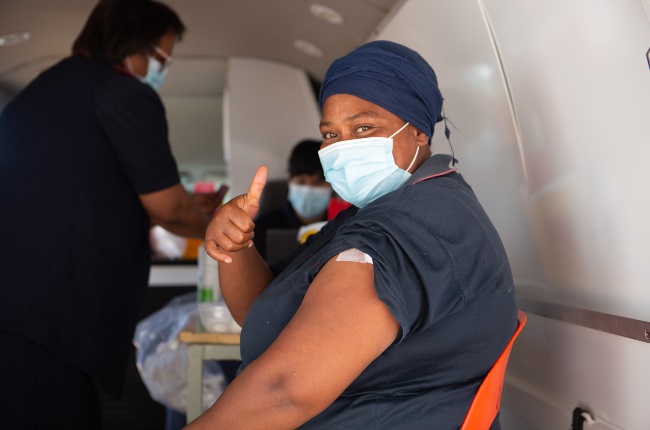
With reports of overburdened hospitals, burial places and crematoriums in China, due to Covid-19, and moves by 12 countries to impose travel restrictions on travellers from the country, many in SA have been feeling uneasy since December.
Positive coronavirus cases in the US, Japan, South Korea and Brazil have also surged, accounting – along with China – for more than two-thirds (70%) of new infections globally.
However, SA has no need to worry right now, said Health Minister Joe Phaahla, addressing the media on 10 February 2023, following the announcement on 7 January, that the XBB.1.5 subvariant of Omicron had been detected in an unknown patient.
The XBB.1.5 subvariant of Omicron, informally called Kraken, has been termed “as the “most transmissible subvariant”, causing widespread panic globally.
“Only one specimen has been found to test positive for this sub-variant,” said Phaahla, referring to the sample detected in the Western Cape following sequencing carried out by Stellenbosch University from a 27 December 2022 sample.
“It was submitted as a random sample, so there are no details of the patient,” he emphasised, adding that increased testing and monitoring would help us know more about how prevalent the subvariant is in SA.
“Omicron remains the variant of concern at between 97-98% and has had more than 100 subvariants or sublineages since 2021.”
The current advice from scientists and the World Health Organization (WHO) to SA, said Phaahla, is to increase testing and sequencing, but there is no need to impose restrictions on travellers from highly affected countries such as China and the US, or to introduce any restrictions locally.
Read more | Katlehong family wants answers after another SA teacher dies under mysterious circumstances in China
From the end of this month, those above the age of 18 can get their fourth booster shots, while over-50s can get their fifth, the minister also announced.
Department of Health vaccination team leader Dr Lesley Bamford explained the vaccination roll-out programme.
“We anticipate that all adults will be offered another booster dose. We expect that this will take place in January, probably towards the end of this month,” she said.
“Adults 50 years and older are currently eligible to receive a total of four doses and adults 18 to 49 years are eligible to receive three doses. It is our intention to offer an additional dose. So that will be a fifth dose for people 50 years and older, and a fourth dose for people 18 to 49 years of age.
“With regards to the immunocompromised, we are trying to move away from number of doses. Any adult who has not had a dose in the past six months, whether they are immunocompromised or not, will be eligible to receive an additional booster dose. The period between the doses will be 180 days.”
Read more | It breaks his heart to know his twins (5), struck by a BMW, will never wear their new school uniform
“Our booster doses already are heterologous booster doses, so people can mix and match between the two different vaccines that are available in South Africa. So we will continue to offer the heterologous boosting,” Dr Bamford added.
Announcing the shift to heterologous boosters last year, the department said, “The decision regarding which vaccine to administer as a booster should be guided by vaccine availability. If both vaccines are available, homologous boosting should be preferred, unless the vaccinee requests to receive a heterologous booster dose or has a history of experiencing an adverse event following immunisation.”
What is it?
The department defines a heterologous booster vaccines as “booster doses of a different vaccine to that which was administered as the primary series”. Homologous boosting is when you get a shot of the same vaccine you got previously.
Why now?
This is not the first time the mixed-dose approach is being adopted in public health. Technically, it’s always been possible to mix and match the Covid-19 vaccines, says UCT’s School of Public Health & Family Medicine Head of the Division of Epidemiology and Biostatistics Professor Landon Myer.
“The hesitation, traditionally, is that in other areas of vaccines usually we have one vaccine and we make it a booster. But you get a booster of the same vaccine, and so we are accustomed to giving the same vaccine. It’s not a common situation in vaccines and in public health to have multiple vaccines floating around for the same indication and you need to boost and you mix the boosters. So it’s not that it’s anything weird or risky at all. It’s just that it doesn’t come up that much in public health. And I think that’s the hesitation – because it’s something that we don’t do a lot,” Professor Myer explains.
“The upside of it is that vaccines work in different ways – the major vaccines particularly, J&J, Pfizer, Moderna and AstraZeneca – they do work in slightly different ways to achieve the same goal,” says the epidemiologist.
“And there is a reasonable body of thought that hypothetically it could be better to prime your immune system in different ways; to get your immune system ready for Covid in different ways rather than repeating the same way over and over. There’s not a lot of data on this, I want to be clear. But it is something certainly interesting and that people may want to think about.”
Who qualifies?
Only people who are 18 and above qualify for ‘mix and match’ booster shots. The period between the doses will be 180 days.
Why get vaccinated?
“You get lots of vaccines,” says Prof Myer.
“Vaccines are safe, they play a huge role in maintaining the public health and protecting individuals in South Africa, all over the world, and vaccines are a core part of keeping people healthy in our population.”



















